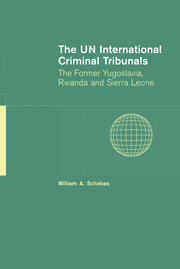Book contents
- Frontmatter
- Contents
- Preface
- Table of cases
- Table of legislative provisions
- List of abbreviations
- PART I Establishment of the tribunals
- PART II Jurisdiction
- 4 Territorial, personal and temporal jurisdiction
- 5 Subject-matter jurisdiction generally
- 6 Genocide
- 7 Crimes against humanity
- 8 War crimes
- PART III Substantive and procedural aspects of prosecution
- PART IV Organisation of the tribunals
- Bibliography
- Index
6 - Genocide
Published online by Cambridge University Press: 05 June 2012
- Frontmatter
- Contents
- Preface
- Table of cases
- Table of legislative provisions
- List of abbreviations
- PART I Establishment of the tribunals
- PART II Jurisdiction
- 4 Territorial, personal and temporal jurisdiction
- 5 Subject-matter jurisdiction generally
- 6 Genocide
- 7 Crimes against humanity
- 8 War crimes
- PART III Substantive and procedural aspects of prosecution
- PART IV Organisation of the tribunals
- Bibliography
- Index
Summary
The crime of genocide is included, in identical provisions, within the subject-matter jurisdiction of both the ICTY (article 4) and ICTR (article 2) but not within that of the SCSL. Already, when the ICTY was being contemplated, there had been widespread charges that genocide was being committed during the conflict in Bosnia and Herzegovina. As early as August 1992, the Commission on Human Rights called on States ‘to consider the extent to which the acts committed in Bosnia and Herzegovina and in Croatia constitute genocide’. In its December 1992 resolution on the situation in Bosnia and Herzegovina, the United Nations General Assembly described ‘ethnic cleansing’ as a form of genocide. Nevertheless, the Security Council resolution creating the ICTY, adopted on 8 May 1993, did not refer to genocide. As for Rwanda, despite hesitation within the Security Council to use the ‘g-word’ to describe the atrocities as they unfolded in April 1994, it soon became evident that the most significant manifestation of genocide since the destruction of the European Jews during the 1940s was well underway. By the time the ICTR was created, in November 1994, the term ‘genocide’ had been used by the Special Rapporteur of the Commission on Human Rights, the Commission of Experts, and even the Security Council itself (for the first time in its history). When the Security Council created the ICTR, in somewhat marked contrast with the ICTY, it expressed concern ‘that genocide and other systematic, widespread and flagrant violations of international humanitarian law have been committed in Rwanda’, and said the Tribunal was established ‘for the sole purpose of prosecuting persons responsible for genocide and other serious violations of international humanitarian law’.
- Type
- Chapter
- Information
- The UN International Criminal TribunalsThe Former Yugoslavia, Rwanda and Sierra Leone, pp. 161 - 184Publisher: Cambridge University PressPrint publication year: 2006
- 1
- Cited by

